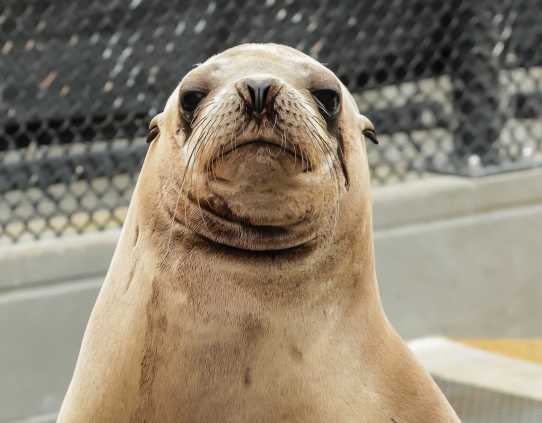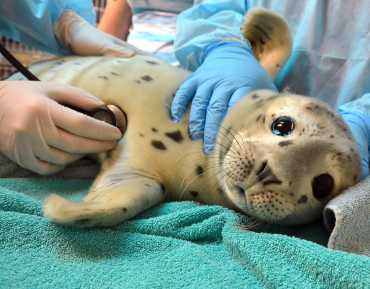
Choose Your Favorite Marine Mammal Patient of 2020!
Thanks to caring people like you, more than 375 marine mammals were rescued in 2020. Now it’s time to recognize some of the most memorable patient stories.
Voting for Patient of the Year for 2020 is now closed.
Here's how you voted:
Lucinda, Pacific Harbor Seal |
24% |
| Maka Kilo, Hawaiian Monk Seal | 22% |
| Neshema, Guadalupe Fur Seal | 17% |
| Zurich, Northern Elephant Seal | 16% |
| Seadog, California Sea Lion | 11% |
| Dracula, Northern Fur Seal | 10% |
Get updates on patients like these delivered straight to your inbox!
Adopt Your Favorite!
Want to show your favorite patients even more love? Each one of our Patient of the Year nominees is available as a digitally downloadable Adopt-a-Seal®! Your symbolic adoption comes with a certificate featuring the patient’s photo and story, and proceeds support the life-saving care for the next sick or injured animal.
Seadog - California Sea Lion
Rescued: June 12, 2020
Released: July 16, 2020
Diagnosis: Domoic acid intoxication, pneumonia
California sea lion Seadog was spotted not looking like a healthy young sea lion should. He was brought to our hospital where our expert veterinarians determined that he was showing signs of domoic acid toxicity. Domoic acid, a potentially deadly neurotoxin, accumulates in small fish like sardines and anchovies. So the hearty meals that should have nourished Seadog instead made him deathly ill. This toxin can also impact humans, but caring for patients like Seadog helps protect human health. That’s because it allows our scientists to alert officials who can then regulate the seafood that ends up on our plates. Luckily Seadog came into our care before too much harm was done. You see, if left untreated, domoic acid can cause permanent brain damage or even death. After about a month of care, Seadog was granted a clean bill of health and released back to his ocean home with a second chance.

Zurich - Northern Elephant Seal
Rescued: June 4, 2020
Released: August 27, 2020
Diagnosis: Malnutrition
Northern elephant seal pup Zurich was found on a beach looking much too skinny. It was clear she was not getting enough to eat out in the wild and likely faced a sad fate without help. Luckily, Zurich was rescued and brought to our hospital where she received the medical care she desperately needed. Animal care experts noted that Zurich was one of the smallest elephant seal pups onsite at the time. But as she began to eat her nutritious fish meals, Zurich slowly put on a healthy amount of weight and regained her strength. After nearly three months of care, Zurich received a clean bill of health and was released back to her ocean home just steps away from our main hospital.

Dracula - Northern Fur Seal
Rescued: October 30, 2020
Released: December 10, 2020
Diagnosis: Malnutrition, maternal separation
Northern fur seal Dracula was only three to four months old when he was found in a scary situation. Weak, malnourished and with his mother nowhere in sight, Dracula was in need of a miracle. After our trained responders safely transported this pup to our hospital, our veterinarians prescribed him a treatment plan that included plenty of nutritious fish meals, antibiotics and fluids. Dracula began to slowly regain his strength. It wasn’t long before he was practicing important skills he would need to survive in the wild, like catching fish and competing for food with his pen-mates. After about six weeks of care, Dracula had transformed from a weak, skinny pup to a fur seal ready for his second chance at life. Dracula was released back to his ocean home alongside other fur seals his age.

Lucinda - Pacific Harbor Seal
Rescued: September 10, 2020
Released: October 12, 2020
Diagnosis: Entanglement, malnutrition
Harbor seal pup Lucinda was found with fishing gear dangling from her tiny body. The most heartbreaking part was that Lucinda’s mouth was tugged at each time she moved her front flipper due to the hooks and fishing line that connected them. Once at our hospital, Lucinda’s admit exam revealed that her entanglement was worse than what could be seen at first glance. Using advanced medical equipment, our veterinarians were able to see inside Lucinda’s tiny body, where they discovered a third hook embedded in her stomach that would have to be removed surgically. Luckily, Lucinda recovered well after her disentanglement surgery. In fact, she started eating the very next day! It wasn’t long before Lucinda made a full recovery and was released back to the wild with a second chance at life.

Neshema - Guadalupe Fur Seal
Rescued: June 11, 2020
Released: July 23, 2020
Diagnosis: Entanglement, malnutrition
Guadalupe fur seal Neshema was found so tangled up in heavy fishing gear that he was unable to swim well enough to catch fish. Weak and malnourished, this young fur seal faced a heartbreaking fate without help. Trained responders rescued Neshema and safely brought him to our hospital for the medical care he so desperately needed. Guadalupe fur seals have one of the highest rates of entanglement among our patients, and experts are concerned that these life-threatening entrapments are harming this threatened species’ chance at recovering. After the fishing gear was carefully removed, Neshema began to heal. Finally, after just over a month of care, Neshema was ready to return to his ocean home with a second chance at life.

Maka Kilo - Hawaiian Monk Seal
Rescued: September 3, 2019
Released: August 5, 2020
Diagnosis: Maternal separation, malnutrition
Hawaiian monk seal pup Maka Kilo was found in the Northwestern Hawaiian Islands looking much too skinny. In fact, she was so small at her time of rescue that experts estimated she had a less than one percent chance of surviving on her own during the coming winter. As one of the most endangered marine mammals, saving an individual monk seal means everything. So it was critical that Maka Kilo be brought to Ke Kai Ola, our hospital on the Big Island dedicated to saving this endangered species, for medical care. Once at our hospital, Maka Kilo was tube-fed a nutritious fish-mash smoothie which helped her regain her strength. For as thin as she was, Maka Kilo was playful and sociable with her pen-mate. After months of care, this once-underweight monk seal pup grew into a seal capable of thriving in the wild. She was fitted with a satellite tag (so researchers could track her movements in the wild!) and released with three other monk seals at Midway Atoll.

Can’t find your favorite patient of 2020? Share your nomination on The Marine Mammal Center’s Facebook page!
Patient images © The Marine Mammal Center / NOAA permit #18786
Yes, I want to save a life!

Yes, I want to save a life!
You’ll be giving sick and injured animals the best possible care at the Center’s state-of-the-art hospital. With your gift today, you are giving a patient a second chance at life in the wild.
See Our Latest News
{"image":"\/Animals\/Wild\/Gray whale\/cropped-images\/two-gray-whales-golden-gate-bridge-shutterstock-0-0-1270-992-1770234810.jpg","alt":"two gray whales under the Golden Gate Bridge","title":"The Marine Mammal Center and San Francisco Harbor Safety Committee Pilot New Vessel Operator Training Program","link_url":"https:\/\/www.marinemammalcenter.org\/news\/the-marine-mammal-center-and-san-francisco-harbor-safety-committee-pilot-new-vessel-operator-training-program","label":"Press Release","date":"2026-02-06 01:00:00"}

The Marine Mammal Center and San Francisco Harbor Safety Committee Pilot New Vessel Operator Training Program
February 6, 2026
Read More{"image":"\/Animals\/Wild\/Bottlenose dolphin\/cropped-images\/dolphinphoto-by-adam-li-c-noaa-0-0-1270-992-1769539954.jpg","alt":"A bottlenose dolphin jumps out of the water.","title":"What\u2019s the Difference Between Dolphins and Porpoises? And Other Animal Trivia","link_url":"https:\/\/www.marinemammalcenter.org\/news\/whats-the-difference-between-dolphins-and-porpoises-and-other-animal-trivia","label":"News Update","date":"2026-01-26 23:00:00"}

What’s the Difference Between Dolphins and Porpoises? And Other Animal Trivia
January 26, 2026
Read More{"image":"\/Animals\/Patients\/Sea otters\/2025\/cropped-images\/so-mooring-release-2-laurie-miller-c-the-marine-mammal-center-USFWS-permit-MA101713-1-147-8-1270-992-1770307740.jpg","alt":"Sea otter - Mooring","title":"Rescue Stories: Southern Sea Otter Mooring Named the 2025 Patient of the Year","link_url":"https:\/\/www.marinemammalcenter.org\/news\/rescue-stories-vote-for-your-favorite-marine-mammal-patient-of-2025","label":"News Update","date":"2026-01-16 10:05:08"}

Rescue Stories: Southern Sea Otter Mooring Named the 2025 Patient of the Year
January 16, 2026
Read More{"image":"\/People\/Action\/Veterinary care\/cropped-images\/Harris_Green turtle_TMMC-0-0-1270-992-1767649941.jpg","alt":"Heather Harris","title":"Seattle Aquarium Awards Dr. Heather Harris With Prestigious Conservation Research Award","link_url":"https:\/\/www.marinemammalcenter.org\/news\/seattle-aquarium-awards-dr-heather-harris-with-prestigious-conservation-research-award","label":"In the News","date":"2026-01-05 04:48:00"}

Seattle Aquarium Awards Dr. Heather Harris With Prestigious Conservation Research Award
January 5, 2026
Read More